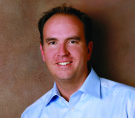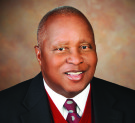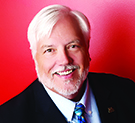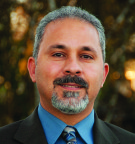From the Sidelines
By Ann Floor

Holly Rowe interviews Baylor University football player Bryce Petty (now with the NFL’s New York Jets) during a 2014 game. (Photo by Joe Faraoni/ ESPN Images)
Holly Rowe BA’04 has known from the time she was in fifth grade that she wanted to be a reporter. This year, she is celebrating her 20th year on the sidelines covering everything from volleyball, March Madness, and college softball to the World Series, gymnastics, and especially, college football for the ESPN sports television network. Her energy, enthusiasm, spunk, and just plain tenacity for getting the interview—her “great hustle”—have earned her high praise from her peers.
How did you become so interested in covering sports?
My father, Del B. Rowe [JD’60 ], loved sports. He took me to everything. We lived in Bountiful, Utah, and attended games during the U’s glory days of basketball with Jeff Judkins [BS’84], Jeff Jonas [BS’77], Danny Vranes [ex’81], and Tom Chambers [ex’77]. I can honestly say I am sports obsessed. I work covering sports about 45 weekends a year, and on my few weekends off, I attend sporting events. I just can’t help myself. I love it and feel so lucky to have a job that I feel so passionate about. I am one of those who has never “worked” a day in my life because I love what I do.
How did your broadcast journalism classes at the U help prepare you for your work as a sportscaster?
I had a wonderful professor, Louise Degn [ex’83], who was a tough critic on the stories we would do. I still hear her voice in my head saying, “No excuses!” She didn’t want to hear what went wrong—she just wanted to see a good story. This helped me get used to how real bosses and news directors work. And I was so proud to get an A in a basketball coaching class from Rick Majerus. He was great to me. I’ve always believed the letter of recommendation he wrote for me was the reason I got a pivotal internship that launched my career. When he died, I flew to Milwaukee to attend his funeral because I am just so grateful that he took the time to help me in what turned out to be a crucial stepping stone in my career.
What was one of your more memorable interviews?
I once interviewed Indianapolis Colts tight end Dallas Clark through the ear hole in his helmet because fans had rushed the field and he didn’t want to take it off. I grabbed his facemask and screamed in his ear holes so he could hear me. It was hilarious and crazy. It’s everyone for themselves out there—you have to fight for your interview. Another time, hundreds of fans stormed the basketball court at Kansas State when they beat the Kansas Jayhawks in an upset, so to avoid getting crushed, I got pulled up on the scoring table along with some of the players and did an interview with Thomas Gipson. I was wedged between him and another player above a sea of screaming fans, the table wobbling under me. At the time, it seemed totally normal, but when I see it on video… not so much. And as my longtime broadcast partner Brent Musburger told me, “Hey, it’s show business, baby!”
You do media training with college athletes around the country to prepare them to do well in interviews. What do they tend to need the most help with?
So many people don’t realize how they come across on camera, so I like to do one-on-one sessions where we tape the interview and then watch it together. It allows us to make quick, lasting fixes that will help them present themselves better to the media. The number one problem is the use of “uh” or “you know” multiple times when they respond to a question. It’s a habit they don’t even know they have. And there’s often a lot of rocking back and forth. They need to be strong. We also go over how their social media posts can influence others’ opinion about them before they even meet. I urge the athletes to be sure that what they are posting reflects the true image they want to present. I have had many coaches tell me they quit recruiting kids after seeing what they post on social media—a good lesson to remember.
What do you enjoy most about your job?
Everything! I have met some of the most amazing people—from Pat Summitt to LeBron James. I still have the paycheck stub from the first interview I did with Michael Jordan when I earned $25 as a stringer for Chicago Radio. I am passionate about finding and telling compelling stories. It makes me happy. And of course the games. There’s nothing like competition.
—Ann Floor is an associate editor of Continuum.
Ed. note: In early 2016, Rowe found herself undergoing a second surgery to remove a tumor from her chest. Read a February 2016 update on Rowe in the Inquisitr news feature here.
Web Exclusive Photo Gallery
A Home in the Opera
By Marcia C. Dibble

Hugo Vera performs in La Traviata at Philadelphia’s City Center Opera Theater in 2013, with Jennifer Holbrook. (Photos courtesy Hugo Vera)
Now in his seventh season with The Metropolitan Opera, tenor Hugo Vera got his start with the Met as an understudy in a production of From the House of the Dead in 2009, when they invited him to audition after a scout saw him perform at the Chautauqua Music Festival. Since then, the University of Utah alum has sung (or waited in the wings as an understudy) in more than 100 performances with the Met, including a turn as the messenger in Aida that he counts among his most memorable “because I got the pleasure and honor of being conducted by the famous tenor Plácido Domingo, who is my all-time idol.”
Vera BMu’95 (magna cum laude) didn’t set out to become an opera singer—or any kind of singer, as a matter of fact. “I actually never sang before going to the U,” he says. His roommate at the time needed a one credit hour class, decided choir was a good option, and convinced Vera to audition with him.
“When I auditioned, I was asked if I would be interested in taking voice lessons,” Vera recalls. “I needed another one credit hour to fill, so I said yes.”
Vera, who was then a communication major and a member of the U speech and debate team, eventually changed his major to vocal performance. He had long loved music, and he played the saxophone with the wind ensemble, marimba ensemble, and marching band both in high school and at the U. His parents were also both amateur musicians—his mother a singer and his father a percussionist.
Vera had initially planned to attend college in his home state of Texas but changed his mind soon after visiting friends in Salt Lake City. “I took a tour of the University of Utah and just fell in love with the school, area, and people—so I stayed,” he recalls. At the U, Vera worked with professor and professional tenor Robert Breault, who in addition to teaching also continues to perform nationally and internationally, with companies including New York City Opera, Bayerischer Rundfunk Symphonieorchester, and Opéra de Nice. “He took the voice/opera program to the next level and truly challenged me as a singer and performer,” Vera says.
After receiving his music degree at the U, Vera continued his training with noteworthy young-artist programs, including the Aspen Opera Theater Center and Glimmerglass Opera. He eventually went on to receive master’s and doctoral degrees in music—both with honors—from the University of Kansas.
Over the years, Vera has performed important principal roles including Manrico (Il Trovatore), Cavaradossi (Tosca), Pinkerton (Madama Butterfly), Faust (Faust), Alfredo (La Traviata), and Radames (Aida, in a role perhaps most famously performed by Domingo). But his favorite role is Don José from Carmen—which he has performed with The Aspen Opera Theatre, Opera North, GLOW Lyric Theatre, LOLA, and (just this past August) the Lawrence Opera Theatre in Kansas, where he is general and artistic director. He also maintains a schedule as a soloist with orchestras across the country, and he has performed at the Spoleto and Tanglewood festivals and soloed at Carnegie Hall.
Vera maintains a private voice studio in New York City and remains on the roster at the Met. He also started a new permanent position this August as assistant professor of voice at the University of Arizona. “The title of my position at UA is artist in residence, so part of that is to continue to keep performing,” notes Vera. “So, I am feeding both my teaching and performing needs.”
His concerts this fall include Carmina Burana at Concordia Santa Fe on September 20, a solo with the Arizona Symphony Orchestra on November 17, and Messiah with the El Paso Choral Society on December 12. He even makes it back to Utah on occasion and last fall was an artist in residence at Westminster College. During his stay, he had an opportunity to visit Gardner Hall on the U’s campus, he says. “My how it was changed!”
—Marcia Dibble is managing editor of Continuum.
Web Exclusive Videos
Web Exclusive Photo Gallery
[nggallery id=120]
Alumni Board Welcomes Six New Directors
The University of Utah Alumni Association has six new members of its Board of Directors, as well as new presidents for three of its affiliated boards. The new members and leaders were introduced by board President Julie Barrett BA’70 and Vice President Scott Verhaaren BA’90 MBA’91 at the association’s annual board meeting in May.
The new directors are John Dunn, Matthew Gregory, Annie Nebeker, Joseph Sargetakis, Carolyn Schubach, and John Ward.
 Dunn BA’92 JD’95 is president and chief executive officer of Metro Ready Mix, a Utah-based concrete company, and the founder and managing director of the investment firm Banyan Ventures. He received an undergraduate degree in political science and went on to graduate from the U’s College of Law.
Dunn BA’92 JD’95 is president and chief executive officer of Metro Ready Mix, a Utah-based concrete company, and the founder and managing director of the investment firm Banyan Ventures. He received an undergraduate degree in political science and went on to graduate from the U’s College of Law.
 Gregory BS’85 is the chief sales officer for Arches Health Plan. He has had a long career in the health care insurance industry and prior to joining Arches was a vice president with Leavitt Benefits Practice Group from 2001 to 2013.
Gregory BS’85 is the chief sales officer for Arches Health Plan. He has had a long career in the health care insurance industry and prior to joining Arches was a vice president with Leavitt Benefits Practice Group from 2001 to 2013.
 Nebeker HBA’87 PhD’10 is a clinical social worker with the Breast Cancer Clinic at the Huntsman Cancer Institute. She previously served as the U’s dean of students from 2007 to 2013. She holds a bachelor’s degree and a doctorate from the U, as well as a master’s degree from the University of Pennsylvania.
Nebeker HBA’87 PhD’10 is a clinical social worker with the Breast Cancer Clinic at the Huntsman Cancer Institute. She previously served as the U’s dean of students from 2007 to 2013. She holds a bachelor’s degree and a doctorate from the U, as well as a master’s degree from the University of Pennsylvania.
 Sargetakis BA’80 is a co-owner of Frog Bench Farms, which supplies organic produce to farm-to-table restaurants in Salt Lake City. He also is the distribution manager for Parallel Wines. Prior to those endeavors, he was a vice president and financial advisor with Morgan Stanley from 1998 to 2006 and an account vice president with Kidder Peabody/Paine Webber from 1987 to 1998. He received his bachelor’s degree at the U in organizational communications.
Sargetakis BA’80 is a co-owner of Frog Bench Farms, which supplies organic produce to farm-to-table restaurants in Salt Lake City. He also is the distribution manager for Parallel Wines. Prior to those endeavors, he was a vice president and financial advisor with Morgan Stanley from 1998 to 2006 and an account vice president with Kidder Peabody/Paine Webber from 1987 to 1998. He received his bachelor’s degree at the U in organizational communications.
 Schubach MEd’72 has had an accomplished career as a K-12 educator and most recently served as the associate director for Advanced Learning and Dual Immersion Programs for Granite School District. In June, she became director for dual language immersion programs statewide for the Utah State Office of Education. She received her master’s degree in education from the U.
Schubach MEd’72 has had an accomplished career as a K-12 educator and most recently served as the associate director for Advanced Learning and Dual Immersion Programs for Granite School District. In June, she became director for dual language immersion programs statewide for the Utah State Office of Education. She received her master’s degree in education from the U.
 Ward BS’82 has been the chief financial officer for Harmons Grocery since 2000. Previously, he was president of the HealthGroup, a manufacturer and seller of medical products. He holds a bachelor’s degree in economics from the U and an MBA from Westminster College.
Ward BS’82 has been the chief financial officer for Harmons Grocery since 2000. Previously, he was president of the HealthGroup, a manufacturer and seller of medical products. He holds a bachelor’s degree in economics from the U and an MBA from Westminster College.
The Alumni Association also welcomed three new presidents of its affiliated boards. Jim Cannon BA’68 is now president of the Emeritus Alumni Board. Gail Ellison BA’12 leads the Beehive Honor Society Board. And Mary Neville is the new president of the Student Alumni Board.
U Graduates Form Brazil Alumni Club
The University of Utah now has a Brazil Alumni Club. Graduates in and from Brazil formed the club this spring, bringing the total number of U international alumni clubs to 11.
The U has 144 Brazilian alumni, and 80 students from Brazil are enrolled at the University this year. The president of the new Brazil Alumni Club is Jefferson Dias da Silva BS’07, who lives in São Paulo. After receiving his undergraduate degree in information systems at the U, he went on to get an MBA from Florida Christian University, and he now works as a channel and product manager for Hewlett-Packard in Brazil.
The U Brazil Alumni Club also has three board members: Chase Olson BA’13, who lives in Campinas; Mark Neeleman BA’05, in Florionopolos; and Berthold Kriegshäuser PhD’97, in Rio de Janeiro. Olson, who received his degree from the U in international studies with an emphasis in Latin America, works as a client retention leader for Vigzul, a security service company based in Campinas. Neeleman, whose U degree also is in international studies, has been involved in several entrepreneurial endeavors since graduation and now is founder and executive director of Bamazon Technologies, a company that develops bamboo for use as a wood replacement, with the aim of helping halt the deforestation of the Amazon rainforest. Kriegshäuser, who received his doctorate in geophysics from the U, manages geoscience and reservoir navigation teams across Latin America for Baker Hughes, an oilfield service company.
The U currently has 10 other alumni clubs, along with the new Brazil club, in China, Europe, Hong Kong, India, Mongolia, South Korea, Taiwan, Thailand, Turkey, and Vietnam.
Get Ready for Two Away-Game Tailgates
 Join the University of Utah Alumni Association for two away-game tailgate parties for the 2015 football season! The events will be held at two Pac-12 venues: the University of Southern California and the University of Washington.
Join the University of Utah Alumni Association for two away-game tailgate parties for the 2015 football season! The events will be held at two Pac-12 venues: the University of Southern California and the University of Washington.
The Official Utah Tailgate at USC will be held Saturday, October 24, near the stadium in Los Angeles. The tailgate party for the Washington game will take place Saturday, November 7, in Seattle. Both tailgate parties will begin two hours prior to kickoff.
The tailgates will include a full buffet with food and beverages, as well as prizes, giveaways, Utah merchandise, music, and more. For prices and registration, visit ulink.utah.edu/tailgates.
U Alumni Gather for European Reunion in Salzburg
About 40 University of Utah alumni from eight countries attended this year’s U European Alumni Reunion in Salzburg, Austria, along with U President David W. Pershing and his wife, Sandi. Alumni from Austria, Armenia, Belgium, Egypt, Germany, Romania, Ukraine, and the United States gathered for the festivities that were held May 23 and 24.
The reunion included a walking tour of the historical section of Salzburg, with visits to St. Andrä Church at Mirabellplatz and the house where composer Wolfgang Amadeus Mozart was born. At the historic Stiegl Brauwelt Brewery, the alumni heard from the Pershings. The president spoke about recent developments at the University in academics, medicine, and research, as well as the U’s international activities. Sandi Pershing, the U’s assistant vice president for engagement, then presented the annual award for contributions to the European Alumni Club to Elke Binder, from Austria. Binder, who was an exchange student at the U in 1993-94, has attended eight previous reunions and helped organize the 2004 Vienna reunion.
The U alumni also listened to a presentation from U law professor Wayne McCormack, who spoke about scholarship and teaching of international law at the University of Utah. Nelly Divricean BS’09 MS’12, the U Alumni Association’s international alumni relations manager, then announced the first two recipients of European Alumni Club scholarships: Alina Safargalina, from Russia, who is seeking a doctorate in linguistics, and Jelena Cingara from Serbia, who is pursuing a doctorate in piano performance.
The new European Alumni Club president and board members also were introduced. Peter Huber MS’96, an alum from Germany who received his degree in medical informatics from the U, will serve as the club’s president. Kasper Grann, who was a U exchange student in 2009 from Denmark, and Helgi Geirhardsson MS’87, an alum from Iceland who received her engineering degree at the U, are now board members, along with ongoing board member Alexandra Kaul BS’87 MBA’88, from Germany.
Through the Years: Class Notes
1950s
 Paul A. Hauck MA’51 PhD’53 recently received the 2014 Albert Ellis Humanitarian Award for his contributions to the field of mental health. Hauck, a psychologist who practices in the northwestern Illinois and southeastern Iowa areas, was instrumental in the development of cognitive behavior therapy. His 16 popular psychology “how to” books, which have been translated into a score of languages, remain top sellers today. The award is presented each year by the New York-based Albert Ellis Institute, a psychotherapy training institute. Ellis was the founder of cognitive behavior therapy, which treats issues including anxiety, depression, jealousy, and emotional behavioral problems by teaching coping skills for current and future problems. Most of Hauck’s books are based on that approach. Hauck received both his master’s and doctoral degrees in psychology from the University of Utah.
Paul A. Hauck MA’51 PhD’53 recently received the 2014 Albert Ellis Humanitarian Award for his contributions to the field of mental health. Hauck, a psychologist who practices in the northwestern Illinois and southeastern Iowa areas, was instrumental in the development of cognitive behavior therapy. His 16 popular psychology “how to” books, which have been translated into a score of languages, remain top sellers today. The award is presented each year by the New York-based Albert Ellis Institute, a psychotherapy training institute. Ellis was the founder of cognitive behavior therapy, which treats issues including anxiety, depression, jealousy, and emotional behavioral problems by teaching coping skills for current and future problems. Most of Hauck’s books are based on that approach. Hauck received both his master’s and doctoral degrees in psychology from the University of Utah.
1960s
 Ronald G. Coleman BS’66 PhD’80, a history professor in the University of Utah’s College of Humanities and a former U associate vice president for diversity and faculty development, was one of three honored with a 2015 Humanitarian Award by the Inclusion Center for Community and Justice. The Salt Lake City-based center’s award recognizes individuals and organizations that are involved in building inclusive communities. Coleman received a bachelor’s degree in sociology at the U; a master’s degree in social science (history emphasis) at California State University, Sacramento; and a doctorate in history at the U. He joined the U faculty in 1973 and has also served as coordinator of the Ethnic Studies Program. His primary research focus is African American history in Utah and beyond.
Ronald G. Coleman BS’66 PhD’80, a history professor in the University of Utah’s College of Humanities and a former U associate vice president for diversity and faculty development, was one of three honored with a 2015 Humanitarian Award by the Inclusion Center for Community and Justice. The Salt Lake City-based center’s award recognizes individuals and organizations that are involved in building inclusive communities. Coleman received a bachelor’s degree in sociology at the U; a master’s degree in social science (history emphasis) at California State University, Sacramento; and a doctorate in history at the U. He joined the U faculty in 1973 and has also served as coordinator of the Ethnic Studies Program. His primary research focus is African American history in Utah and beyond.
1970s
 Randy D. Danielsen BS’78 has received the Eugene A. Stead Award of Achievement, the highest award presented by the American Academy of Physician Assistants. The award honors lifetime achievement that has had a significant impact for patients and the profession itself. Danielsen was recognized as a national physician-assistant leader and clinician, and for his accomplished career as an educator and editor. He began his health care career in 1970 as a medical corpsman and served 28 years with the Air Force and the Army National Guard. He received a bachelor’s degree in health at the U, a master’s degree in physician assistant studies from the University of Nebraska, and a doctorate in interdisciplinary arts and education from the Union Institute & University. In 1995, he began teaching in Wichita State University’s physician assistant program. He currently is dean of the Arizona School of Health Sciences and an adjunct associate professor at Nova Southeastern University.
Randy D. Danielsen BS’78 has received the Eugene A. Stead Award of Achievement, the highest award presented by the American Academy of Physician Assistants. The award honors lifetime achievement that has had a significant impact for patients and the profession itself. Danielsen was recognized as a national physician-assistant leader and clinician, and for his accomplished career as an educator and editor. He began his health care career in 1970 as a medical corpsman and served 28 years with the Air Force and the Army National Guard. He received a bachelor’s degree in health at the U, a master’s degree in physician assistant studies from the University of Nebraska, and a doctorate in interdisciplinary arts and education from the Union Institute & University. In 1995, he began teaching in Wichita State University’s physician assistant program. He currently is dean of the Arizona School of Health Sciences and an adjunct associate professor at Nova Southeastern University.
 Stephen R. Morgan BA’78 has been selected as president of Westminster College of Salt Lake City. Appointed by the college’s board of trustees, he becomes the school’s 18th president when he is inaugurated in September. A fixture at the college of 3,000 students for 30 years, Morgan has served as acting president since February. As vice president of institutional advancement, he is credited with building the college’s endowment to more than $70 million and overseeing fundraising for major construction projects at Westminster. Prior to his employment at the college, Morgan was controller for Weidner Communications and a senior auditor for Coopers & Lybrand. He received his bachelor’s degree at the U in accounting.
Stephen R. Morgan BA’78 has been selected as president of Westminster College of Salt Lake City. Appointed by the college’s board of trustees, he becomes the school’s 18th president when he is inaugurated in September. A fixture at the college of 3,000 students for 30 years, Morgan has served as acting president since February. As vice president of institutional advancement, he is credited with building the college’s endowment to more than $70 million and overseeing fundraising for major construction projects at Westminster. Prior to his employment at the college, Morgan was controller for Weidner Communications and a senior auditor for Coopers & Lybrand. He received his bachelor’s degree at the U in accounting.
1990s
 Salam Noor PhD’98, former director of academic planning and policy for the Higher Education Coordinating Commission in the state of Oregon, has been appointed by Governor Kate Brown to lead the Oregon Department of Education. He began in his new position in July. Noor, a first-generation immigrant from Jordan, previously was assistant superintendent and chief academic officer for the Salem-Keizer School District, Oregon’s second largest in enrollment. He is credited with helping improve graduation rates and provide opportunities that engage students and help them prosper beyond high school. “Throughout his career, Salam has shown that he can engage diverse stakeholders in an authentic way and deliver results,” Brown says. Noor received a bachelor’s degree in international relations and a master’s degree in public administration from Eastern Washington University, and a doctorate in political science and Middle East studies from the University of Utah. He also has a certificate from the Executive Leadership Program at Harvard University.
Salam Noor PhD’98, former director of academic planning and policy for the Higher Education Coordinating Commission in the state of Oregon, has been appointed by Governor Kate Brown to lead the Oregon Department of Education. He began in his new position in July. Noor, a first-generation immigrant from Jordan, previously was assistant superintendent and chief academic officer for the Salem-Keizer School District, Oregon’s second largest in enrollment. He is credited with helping improve graduation rates and provide opportunities that engage students and help them prosper beyond high school. “Throughout his career, Salam has shown that he can engage diverse stakeholders in an authentic way and deliver results,” Brown says. Noor received a bachelor’s degree in international relations and a master’s degree in public administration from Eastern Washington University, and a doctorate in political science and Middle East studies from the University of Utah. He also has a certificate from the Executive Leadership Program at Harvard University.
2000s
 Aida Neimarlija BA’03 BS’03 JD’08 was named the Utah State Bar’s 2015 Young Lawyer of the Year. She is an attorney in the law firm of Burbidge Mitchell & Gross, where she has litigated cases in both state and federal courts, including disputes dealing with intellectual property, real estate, catastrophic personal injury and wrongful death, and legal malpractice. During law school, she interned at the Securities and Exchange Commission and served as a judicial extern in the Utah Court of Appeals. Neimarlija also interned at the Special Department for War Crimes of the Prosecutor’s Office in Sarajevo, Bosnia and Herzegovina. She recently served as president of Women Lawyers of Utah, where she created a mentoring program to encourage and better prepare qualified diverse lawyers to apply to the bench. She received two bachelor’s degrees, in economics and political science, from the University of Utah before going on to graduate from the U’s S.J. Quinney College of Law.
Aida Neimarlija BA’03 BS’03 JD’08 was named the Utah State Bar’s 2015 Young Lawyer of the Year. She is an attorney in the law firm of Burbidge Mitchell & Gross, where she has litigated cases in both state and federal courts, including disputes dealing with intellectual property, real estate, catastrophic personal injury and wrongful death, and legal malpractice. During law school, she interned at the Securities and Exchange Commission and served as a judicial extern in the Utah Court of Appeals. Neimarlija also interned at the Special Department for War Crimes of the Prosecutor’s Office in Sarajevo, Bosnia and Herzegovina. She recently served as president of Women Lawyers of Utah, where she created a mentoring program to encourage and better prepare qualified diverse lawyers to apply to the bench. She received two bachelor’s degrees, in economics and political science, from the University of Utah before going on to graduate from the U’s S.J. Quinney College of Law.
To submit alumni news for consideration, email ann.floor@utah.edu. Learn about even more outstanding University of Utah alumni—from Pixar founder Ed Catmull to Kansas City Chiefs QB Alex Smith—here.


